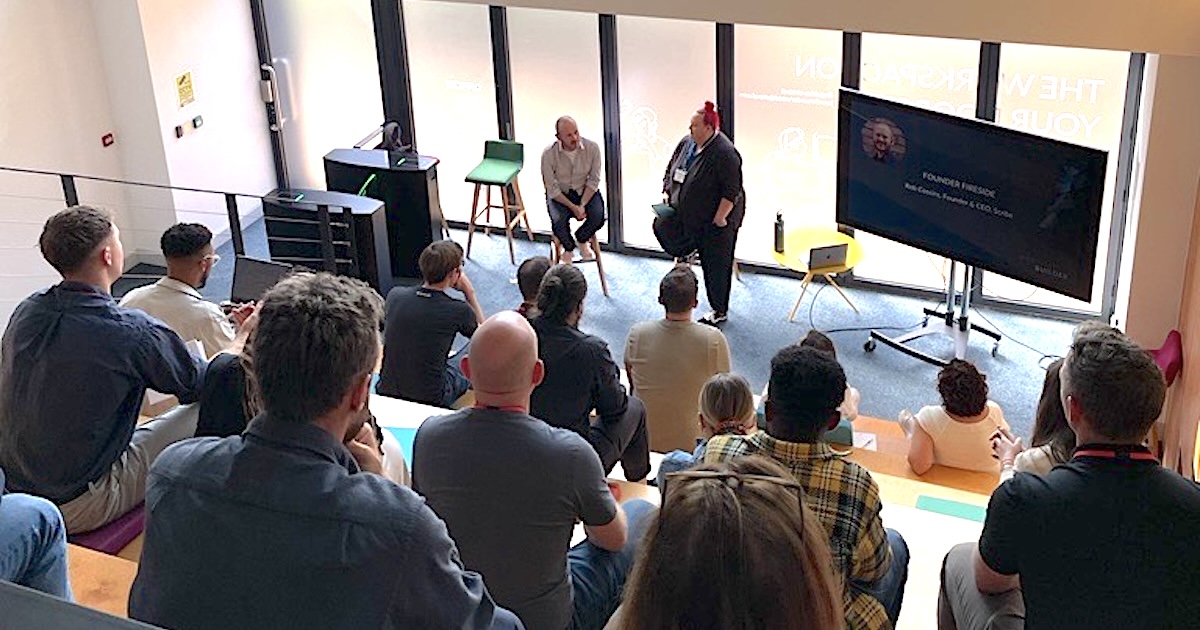We’re accepting applications from idea-stage innovators for our fourth Product Builder Programme, which is powered by Barclays Eagle Labs, funded by the UK government and delivered by Plexal.
This follows the graduation of our third cohort, which is developing solutions for everything from food recommendations based on medical requirements to smart travel assistance. So, if you’ve got a creative company concept along these lines, be sure to submit your application before Monday 21st October.
During our recent Product Builder Bootcamp, Plexal Innovation Lead, Emma Marshall, led a conversation with Rob Cossins, CEO at private company data platform Scribe, as part of a founder fireside – just one example of the type of content you may be exposed to should your application for the programme be a success.
Having worked in a corporate banking environment for seven years, during which Rob conducted company analysis, he quit in 2018 and took a year out to plan his next move. And while he conceded entering the entrepreneurial world is like “jumping off a cliff,” he added that “you have to do it while thinking of financial security” – which is why he freelanced for a friend so he could continue paying his bills as a minimum.
Finally creating the concept for Scribe, he confessed: “I spent six months looking for a technical co-founder unsuccessfully. I went to networking events just expecting developers to be there – they weren’t.” Instead, it was on an accelerator where Rob crossed paths with his business partner instead.
Overcoming the challenge of finding a co-founder presented another immediate barrier – securing customers. “We spent the first six months speaking to lenders and, while lots of people said it’s a great idea, we realised how hard it would be to sell into banks and underestimated that difficulty,” Rob revealed. “We changed our approach to selling automation technology and worked with different organisations to gain traction faster.”
The Scribe founders were still climbing a steep learning curve, however. “We made a ton of mistakes like building tech and iterating based on vague feedback when the reality is people may not be buying your service for other reasons,” explained Rob. “So, we spent 12 months figuring out what people wanted but didn’t build revenue.”
Creating a way to flip this on its head, Rob revealed that when a client presents a list of things to build, there’s actually a better approach to deep dive into a problem. “Having a deep empathy for clients is extremely valuable, though you can become bloated quickly,” he said. The solution was for Scribe to be paid as a consultancy to figure out the problems clients had.
“Customers are buying for a complex web of reasons. For example, an asset manager in the UK uses tech to pull information while another client is buying for your team’s expertise. Finding early adopters is so important to help dictate your go-to-market strategy.”
In one instance, believing there would be no demand, Rob didn’t plan to sell his service to founders. But having been nudged into it by a peer, Scribe is now being used by over 300 founders, with the subsequent solution enabling them to locate investors. “The lesson is, the more people you expose yourself to will allow you to find a use case,” he noted.
Fast forward to the present day and Scribe has secured grants as well as angel and VC funding, allowing growth to a team of ten – but it’s clear this took serious determination. “From initial fundraising conversations to closing around took us 12 months but that’s pretty normal,” Rob highlighted.
“Our method was everything from introductions by people we knew through to cold outreach. All VCs said we were way too early-stage to back but it’s useful to get kicked around a bit because it teaches you resilience. The startup world humbles the hell out of you because nobody owes you anything and fundraising is hard work. We probably had at least 100 to 150 investor calls before reaching a handful who were interested.”
While this was all done the old-fashioned way without a CRM, Rob offered: “Building relationships with people, connecting and being curious is essential. I chased one angel seven times with no response. He told me: ‘If you’re as persistent with the business as you are with chasing, you’ll be a success.’ Now he’s a Scribe investor.
“The golden nugget I’d share is that every fundraise I’ve seen from friends and so on is chaotic. We’re overexposed to large VC-led rounds in the news but most rounds in the UK are messy angel rounds nobody will write about. They won’t go as expected, they may go wrong and they will be chaotic – so the best founders are the most resilient.”
Questioned by Emma about managing the process or, as she put it, “What was it like kissing all the frogs to get your prince, while running the business, adapting the technology and so on?”, Rob admitted it felt somewhat impossible. “There are only so many hours in a day, so you must decide where to spend your time,” Rob advised.
“I’ve seen it work with people being more structured around their day, while other founders are commercial and generate revenue quickly. Americans will convene thousands of people to get an idea off the ground but in the UK we’re more reserved. Perhaps there’s a mindset shift required to find someone that will pay for your product.”
Concluding on how his role has changed, Rob said: “The first period felt like I was pushing a wall for weeks on end compared to corporate life when I would previously receive an email response in minutes. As a founder, you must drive everything that happens and eventually the wall moves an inch. Now we have momentum, which means I must grow faster than the business because everything is changing quickly – so what worked three months ago may not work today. Perserverance, resilience and relationships are key.”
If you want to be part of the Product Builder Programme and access founders such as Rob, apply now.


